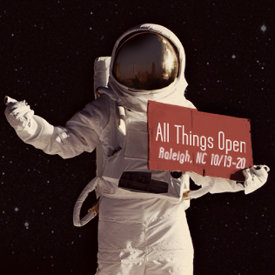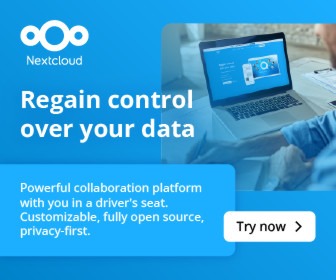Well, here we are, only three weeks away from the third annual All Things Open (ATO) conference, slated to be held in Raleigh on October 19 and 20. ATO is all about the enterprise and is targeted at those who earn their livings in open source tech, be they coders, system administrators or front office folk.
 For the non-enterprise FOSS user, it may seem from a quick glance that ATO has little to offer, but that’s not the case. Buried between all the technically focused talks for devs and sysadmins is a plethora of great workshops for those who’s interest in FOSS doesn’t necessarily include writing code or keeping a server or two operating. In other words, it’s not just about designing GUIs or methods for optimizing databases for intensive cloud use.
For the non-enterprise FOSS user, it may seem from a quick glance that ATO has little to offer, but that’s not the case. Buried between all the technically focused talks for devs and sysadmins is a plethora of great workshops for those who’s interest in FOSS doesn’t necessarily include writing code or keeping a server or two operating. In other words, it’s not just about designing GUIs or methods for optimizing databases for intensive cloud use.
So what does ATO have to offer for those of us who are more interested in eating the open source sausage than seeing how it’s made? Take a look at my dance card for this year’s event as an example:
Understanding Open Source Licenses: This should be a good talk for anyone who wants to get the ol’ mind wrapped around the different FOSS licenses. As I sometimes write on licensing issues for FOSS Force, I’ll be attending this one just to make sure I’m not misunderstanding any of the many open source licenses.
The presenter, Jim Jagielski, comes to the table with more than a little open source cred. A Red Hat employee, he’s the president of the Outercurve Foundation and is one of the co-founders of the Apache Software Foundation, where he’s served as both Chairman and President, and has been on the Board Of Directors since its inception.
Creating an Open Source Office: Lessons From Twitter: Chris Aniszczyk, who is Head of Open Source at Twitter, will be giving this presentation, in which he’ll cover the whys and hows of the creation of Twitter’s open source office. According to the abstract: “We hope you will walk away with an idea on how to start an open source office along with ideas that can…improve open source collaboration within your organization.” I’m attending this one because I’m hoping to get some ideas on how we can improve our office here at FOSS Force, which runs entirely on open source software. Aniszczyk also sits on the Eclipse Foundation’s board, where he represents the committer community.

Many Ways to Move the Needle on Open Source: If you don’t write code or have a lot of bucks to contribute, you might think there’s no way for you to make a difference in the open source world. No so, says Nithya Ruff, who is the director of the Open Source Strategy Office at the flash storage company SanDisk. According to the abstract, some of the areas covered in this talk will be development, marketing, advocacy and community management. Something tells me you might see an in-depth article on this talk on FOSS Force. Stay tuned…
One Platform to Rule Them All: Why Open Source Will Fuel the Internet of Things: For better or worse, the Internet of Things isn’t going to go away and we’re going to find more and more of our devices connected. Speaker Mark Skarpness, the Director of Embedded Software in the Open Source Technology Center at Intel Corporation, says that by 2020 there will be 50 billion connected devices. This workshop should offer a good overview of the current state of IoT, as well as a look at where things are going. He’ll also be able to inform us on Intel’s views — important since Intel will be calling a lot of the shots in this area. Unfortunately, I’ll be sitting this one out, as it’ll be happening at the same time as Nithya Ruff’s presentation, but it would certainly be on my list if it wasn’t.
Systemv Startup vs systemd: With all the continuing brouhaha surrounding systemd, this is a must on my list. From the abstract on this talk, it appears as if this will be a positive take on systemd — pragmatic, since it seems to be here to stay, like it or not — and will seek to explain not only how it works and how to configure it, but to explain why its development was deemed necessary. This one is being conducted by open source software and Linux advocate David Both, who’s byline has appeared on OS/2 Magazine, Linux Magazine, Linux Journal, and OpenSource.com.

Living an Open Source Life: One of the things that attracts many to open source is that it’s not just a method for developing and distributing software, but it’s a philosophy that can be applied to other areas of life. This is a point that is sometimes lost in the economics of software development, especially when the enterprise gets involved. Never fear, Tarus Balog, CEO of the OpenNMS Group, will hold the light and help us stay on the path. I saw him earlier this year at the SouthEast Linux Fest (SELF) and the guy’s a hoot. Go to this one and I’ll guarantee you that you’ll be entertained. You’ll also be informed. Balog has been working with networking and computers since back in the days when the we were just emerging from the disco craze — on a Radio Shack TRS-80.
How to Build Community the Open Source Way: Lordy, lordy, lordy, look what the scheduling folks at ATO have gone and done. They’ve scheduled Jason Hibbets to give his presentation at the same time as Tarus Balog. Both of these guys are evangelists for The Open Source Way, which is the application of open source ideas to other areas besides software development. Like Balog, Hibbets is well worth seeing as it might be said that he wrote the book on The Open Source Way. He and his team have even managed to convince Raleigh’s city government to institute some open source practices in the way it deals with its citizens. In this talk, he’ll focus on using open source ideas for team building and will use Red Hat’s Opensource.com, where he’s been a community manager for five years, as his example.
How and Why Open Source Companies and Projects Can Use Marketing and Work With the Press: This one is being conducted by ZDNet’s Steven J. Vaughan-Nichols and I’m breaking my rule here about not including any presentations that don’t yet have a description posted on the ATO website, as I figure the title pretty much sums it up. Anyway, when I pinged him to ask, he said, “I’ll be doing one of my regulars: dealing with the press basics for open source developers and businesses.” In case you don’t know, SJVN is something of a rock star when it comes to FOSS journalism. He’s also a genuinely nice guy. Oh, he likes baseball and supports his hometown team, the Asheville Tourists.
Savvy Social Media for Open Source Communities: Rikki Endsley, the community manager for Opensource.com who’s worn many FOSS hats over the years, will explain how a project can harness the power of social media “to communicate with contributors, grow its community, and share news and announcements.” Why am I attending this one? Well, the way I figure it, FOSS Force is something of an open source project and maybe I’ll learn something that will help us help people discover our site. Problem is, will I have the time to implement what I learn? Time will tell.
So, that’s my dance card for All Things Open 2015. I’ve left a few slots open, mainly so I can take some time to hobnob with the dudes and dudettes working at the vendors’ tables. If you’re not going to be able to make it this year, I’ll keep you filled in here on FOSS Force. If you are going to attend, I’ll see you there.
Help keep FOSS Force strong. If you like this article, become a subscriber.
Christine Hall has been a journalist since 1971. In 2001, she began writing a weekly consumer computer column and started covering Linux and FOSS in 2002 after making the switch to GNU/Linux. Follow her on Twitter: @BrideOfLinux




systemd is _not_ a good thing. It violates the principles upon
which Unix/Linux are based:
o If it ain’t broke, don’t fix it. SysVinit has been used in
Linux for more than 15 years, and works just fine. Systemd
requires changes in many system and application programs in
order to work with it.
o Modular design. systemd has subsumed dozens of previously
separate working programs into one huge blob.
o Do one thing, and do it well. systemd does many things, some
not well at all.
o Keep data in human-readable form. systemd keeps the system
logs in encrypted form, requiring a special program to read
them. If a problem occurs and that program is not available,
the logs — vital for troubleshooting — will be inaccessible.
The source code for systemd is currently 36 Megabytes — about
50 times the size of an average novel. No one is going to read
_and understand_ the source code in every new update. A
hidden backdoor could easily be included in it, and would never
be found. It provides the ideal attack vector for an entity
like the US government, which happens to be the biggest
customer of Red Hat, the source of systemd.
FOSS and the Internet are vital for the struggle of the human
race against fascism, which has murdered millions of people,
created millions of injured and refugees, and destroyed the
infrastructure of three entire nations, with more underway.
We must _not_ allow a method by which the govt can kill all
computers comprising and attached to the Net — humanity’s
communication system. MS-Windows machines are already totally
vulnerable. That leaves only Linux computers, which we _must_
keep safe.